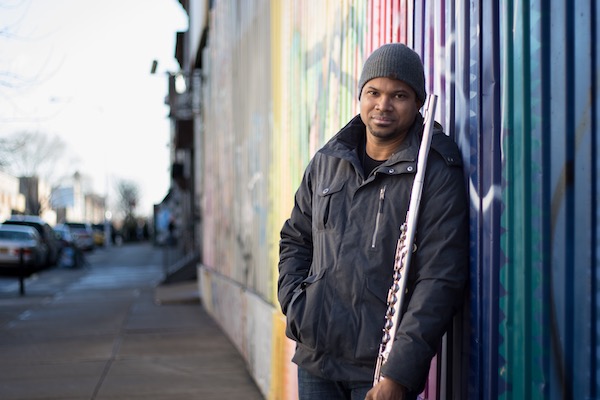Jan 13, 2026 2:09 PM
More Trump-Kennedy Center Cancellations
The fallout from the renaming of the John F. Kennedy Center for the Performing Arts to include President Donald…

Jazz flutist David Bertrand, now based in Brooklyn, hails from Trinidad and Tobago.
(Photo: Juhui Kwon)This Juneteenth, I published my first blog post, which I titled “Black Sound, White Light.” It was a response to multiple claims of solidarity with the Black Lives Matter movement from musician peers in Brooklyn—where the scene, as I have experienced it, is predominantly white and generally unwelcoming (with the exception of my inner circle of friends). To me, many of these claims rang hollow because there was no true introspection, no questioning of why the scene here is almost completely white and why this latest awakening did not stir collective discomfort about the state of our own community. After revisiting more than a decade of memories, I posted my thoughts and walked away from the laptop. I steeled myself for a rapid drop-off in friend count and an even chillier reception at jam sessions (whenever those again become possible).
When I logged back on, however, I saw that friends and contemporaries from around the world had reposted and commented with insightful sincerity. Publicly and privately, musician peers shared their own sense of alienation about being Black, immigrant or female while trying to navigate toward fellowship within and beyond the music. Some peers offered apologies for any past offense or exclusion that might have occurred. It felt hopeful.
In the wider world, systemic racism establishes structures that limit possibilities for Black people, and the jazz world is not immune. This often makes the way difficult for some but not others, and the path forward will remain a lawn of manicured euphemisms until we address and uproot entrenched imbalances.
Deftly protean, postmodern prejudice in the jazz community often masks itself under the pretext of skillfulness: A musician who plays well might be accepted, to a degree, but if not, he or she runs the risk of being scorned musically and reminded of their “otherness.” If the Black musician is inducted but observes the lion’s share of opportunities mostly remain within pre-existing cliques—often fostered by U.S. graduate programs only affordable to those with generational wealth—he or she must decide whether to continue supporting a scene that doesn’t reciprocate professionally or emotionally.
With so much of jazz life paused by the pandemic, we have ample time for deep rumination. I think the first collective step to anti-racist progress must be to assert the value of Black personhood independent of our contributions to the culture. If you’re only moved to claim that our lives matter because your favorite tenor player is Black, that does not help us; a commitment to work through your own biases or apathy to become a true friend and neighbor will.
The friends I’m blessed with have done this, one in particular. Ignoring rain clouds overhead, my family met him on the last Saturday in June at Brooklyn’s Dr. Ronald McNair Park. We wanted to spend some time together before he moved back to his home state. Six feet between us, we recounted how he helped us move apartments in March, right as the NYC lockdown began. As we reminisced, my wife and I watched our baby daughter expand her picnic blanket empire.
At the other end of the park, a buoyant group of young Black people was conducting an informal photo shoot—only to leave when an NYPD patrol car pulled up, slow and obvious. Despite the sobering reminder, I was in the company of a man who sees me as his equal, on and off the bandstand. If any unwarranted attention had been directed at me, he would have challenged it. The clouds finally broke and we all ran home, laughing, to have impromptu coffee and Trinidadian pastries.
Then, as our friend takes his leave—knowing that by his own recollection he has not touched another person since a handshake on March 19—we give him a parting hug, acknowledging that amid his own journey, he has chosen to be my brother. DB
This story originally was published in the September 2020 issue of DownBeat. Subscribe here.

Belá Fleck during an interview with Fredrika Whitfield on CNN.
Jan 13, 2026 2:09 PM
The fallout from the renaming of the John F. Kennedy Center for the Performing Arts to include President Donald…

Peplowski first came to prominence in legacy swing bands, including the final iteration of the Benny Goodman Orchestra, before beginning a solo career in the late 1980s.
Feb 3, 2026 12:10 AM
Ken Peplowski, a clarinetist and tenor saxophonist who straddled the worlds of traditional and modern jazz, died Feb. 2…

The success of Oregon’s first album, 1971’s Music Of Another Present Era, allowed Towner to establish a solo career.
Jan 19, 2026 5:02 PM
Ralph Towner, a guitarist and composer who blended multiple genres, including jazz — and throughout them all remained…

Rico’s Anti-Microbial Instrument Swab
Jan 19, 2026 2:48 PM
With this year’s NAMM Show right around the corner, we can look forward to plenty of new and innovative instruments…

Richie Beirach was particularly renowned for his approach to chromatic harmony, which he used to improvise reharmonizations of originals and standards.
Jan 27, 2026 11:19 AM
Richie Beirach, a pianist and composer who channeled a knowledge of modern classical music into his jazz practice,…